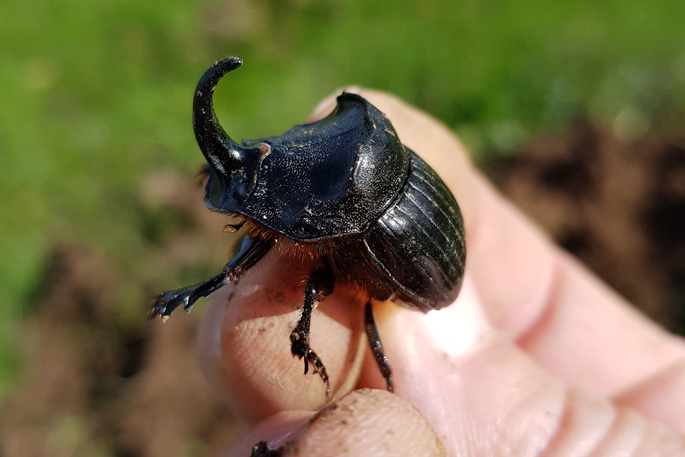With the pressure on New Zealand’s agricultural sector to make progress in how they manage environmental impacts from their operations – from water quality to soil sustainability – Dung Beetle Innovations’ Dr Shaun Forgie says the solution is right under their feet.
“We really need to get people to wake up and realise that dung beetles offer the best and most-likely self-sustainable tool on pasture to resolve all these problems we have,” says Shaun.
“And the season to order dung beetles and start a 12-month package to work towards complete saturation on your property is now.”
Shaun says large grazing animals have been introduced to NZ without the agents that have evolved in their places of origin to process their dung.
“And with NZ farmland usage being intensified, run-off, and contaminants with it, is steadily degrading our waterways, while the residual mess is infecting our animals and impoverishing our pastures.”
But dung beetles’ rapid removal and processing of dung can help, says Shaun. The beetles improve soil health and reduce runoff via their tunneling increasing aeration of soil, allowing water, fertiliser inputs, urine, and nutrients in dung to better penetrate and greatly increase grass root growth and biological activity.
Reduced run-off
“This leads to reduced run-off of rainfall and better retention of dung and urine in soil and, in turn, sees reduced microbial contamination in run-off, less leachate pollution and reduced eutrophication.”
Dung burial also increases the amount of pasture available, and reduces reinfection of livestock by beetles directly or indirectly killing eggs and young larvae of parasitic worms.
Shaun says the rapid manipulation and burial of fresh manure and improved infiltration of urine into deeper soils will also likely reduce production of methane and nitrous oxide, and is therefore likely to decrease emission of associated greenhouse gases.
“While adequate quantification of the influence of dung beetle activity on nitrogen emissions remains to be done, some studies show dung beetle activity during feeding and nesting will stimulate aerobic conditions, altering the microorganism fauna in dung pats and brood balls, thereby reducing methane production.
Commercialised in 2014, Dung Beetle Innovations grew out of a four-year government and enduser-backed project where the EPA approved the import of 11 species of dung beetle to NZ. “Today we have eight species on our books which emerge at different times of the year.
“But the general high-buyer bunch of beetles we tend to supply to farmers happens from December through to April. Then our winter species start from April-May.”
Dung Beetle Innovations’ model for a farm that has on average about 300 cows or about 2000 sheep is to provide a Four-Seasons package.
Farmers receive a colony each of four different species, which get put onto paddocks when they become available and together manage dung produced by animals for 12 months.
“For the typical farm, you get complete saturation of poo produced by your animal stocking rate from year 10 onwards.”
Exponential increase
But Shaun says farmers start seeing things happen in the soil from year five. “We see establishment from year two-three in most places and by year five you start seeing the gains – so a dozen beetles in each cow pat – and even that is a good reduction of dung.
“From year five onwards the exponential increase in these beetles is extraordinary – colonies build up and up and up each season until you get complete and sustained saturation of poo.”
Shaun says the key is buying the right amount of dung beetles proportionate to animal numbers. “And you get them cheaper the more you get.”
And while farmers tend to invest in fencing and planting, Shaun believes dung beetles offer the best opportunity to solve farm environment issues right at the source. “The only low cost preventative, sustainable solution on-pasture – before you even get to fencing or plantings – is dung beetles.
“We need to think catchment-level releases and the Government needs to get onboard if it is serious about achieving its water quality improvement targets.”
Shaun also states dung beetles are estimated to contribute $1 billion to the West Australian economy per annum. “That’s a significant economic gain this country could also benefit from if the Government got on-board.”



0 Comments
Leave a Comment